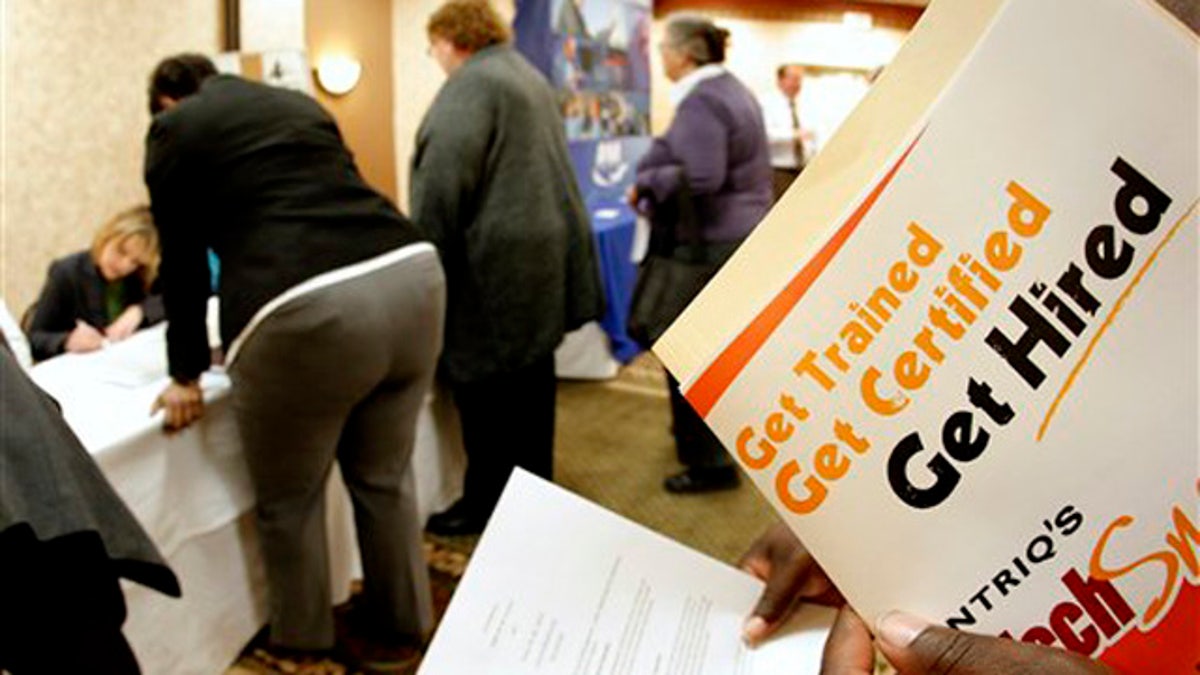
Dec. 1, 2011: Job seekers attend a career fair in Overland Park, Kan. (AP)
The payroll tax cut debate is about a whole lot more than the payroll tax cut.
Though much of the pressure the White House has applied on House Republicans has focused on immediately accepting a two-month extension of the tax cut -- stressing the $40-per-paycheck hit the average family would take without a deal -- several other items are on the chopping block if Congress can't seal a deal.
Most importantly, the House and Senate bills are designed to extend provisions dealing with federal unemployment insurance and the payments doctors receive to treat Medicare patients.
Without the extensions, millions of jobless Americans will start to lose weekly payments and doctors will face a tough choice -- take a deep cut for treating Medicare seniors, or turn them away.
"That's a big deal," William McBride, an economist at the Tax Foundation, said of the so-called "doc fix." "Doctors will be up in arms about that if it doesn't get passed."
The "doc fix" would prevent doctors from seeing a 27 percent cut in payments for treating Medicare patients. The Senate bill would forestall the cut for two months, the House bill for a year.
The bills also contain several other smaller provisions pertaining to federal health care assistance.
Both bills would extend federal aid for ambulance services and therapy services, as well as federal assistance for low-income seniors on their Medicare Part B premiums.
As for jobless aid, the House and Senate each deal with an extension differently. Though without any extension, the outcome is the same -- weekly checks worth roughly $300 for out-of-work Americans would start to dry up earlier than they otherwise would.
Currently, the long-term unemployed can receive government unemployment checks for up to 99 weeks, depending on where they live. The Senate bill would extend that 99-week policy for two months. The House bill would immediately bring the maximum amount down to 79 weeks, with the goal of bringing it down to 59 weeks in most states by the middle of 2012.
Without any extension, the maximum timeframe for jobless aid would be 46 weeks -- paid for with a combination of state and federal funds.
Though some lawmakers have questioned the viability and affordability of continuing to extend the long-term unemployment aid, budget analysts claim the program has a stimulative effect on the economy by putting money right into the pockets of people most likely to spend it.
President Obama, referring to the extension package as a whole, said Thursday that the legislation is "insurance to make sure that our recovery continues."
Long-term unemployment has become a chronic problem. According to the latest Labor Department report, the percentage of jobless Americans out of work for 27 weeks or more was 43 percent in November -- or 5.7 million people.
Another provision the Obama administration previously had touted as critical for jump-starting the economy might also wither at the end of the year, even if the House and Senate are able to come up with a last-minute compromise. The provision, which is current policy, allows businesses to immediately deduct 100 percent of the cost of most new equipment -- as opposed to claiming a deduction for a fraction of the cost over several years.
The administration has estimated this provision reduces capital costs by more than 75 percent for businesses.
The House bill would extend this provision for a year, though the Senate bill would not.
On top of all that are the implications of the payroll tax provision, which has received the most attention in Washington and in the media. Both the House and Senate bills are meant to keep the payroll tax rate -- also known as the Social Security tax -- at 4.2 percent. Without a deal, that rate returns to 6.2 percent next year.
The Obama administration estimates the increase adds up to about $1,000 a year for a household making $50,000 -- or $40 for a two-week paycheck.
Congressional leaders announced Thursday night they had reached a deal to extend the payroll tax cut for two months while starting negotiations on a full-year extension, though the deal still needs the support of rank-and-file members.




